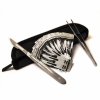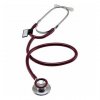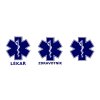Lucie and Jakub Schneider are not only husband and wife but also paramedics who face challenging situations every day. In this interview, they share their experiences from the field, how they cope with psychological strain and stressful situations, and their perspective on the future of paramedic work, which is constantly evolving and bringing new challenges. How did their mountain rescue training go, and how do they balance their demanding profession with their personal life?
Read the interview and take a glimpse into the world of paramedics, where adrenaline, professionalism, and a human approach come together.
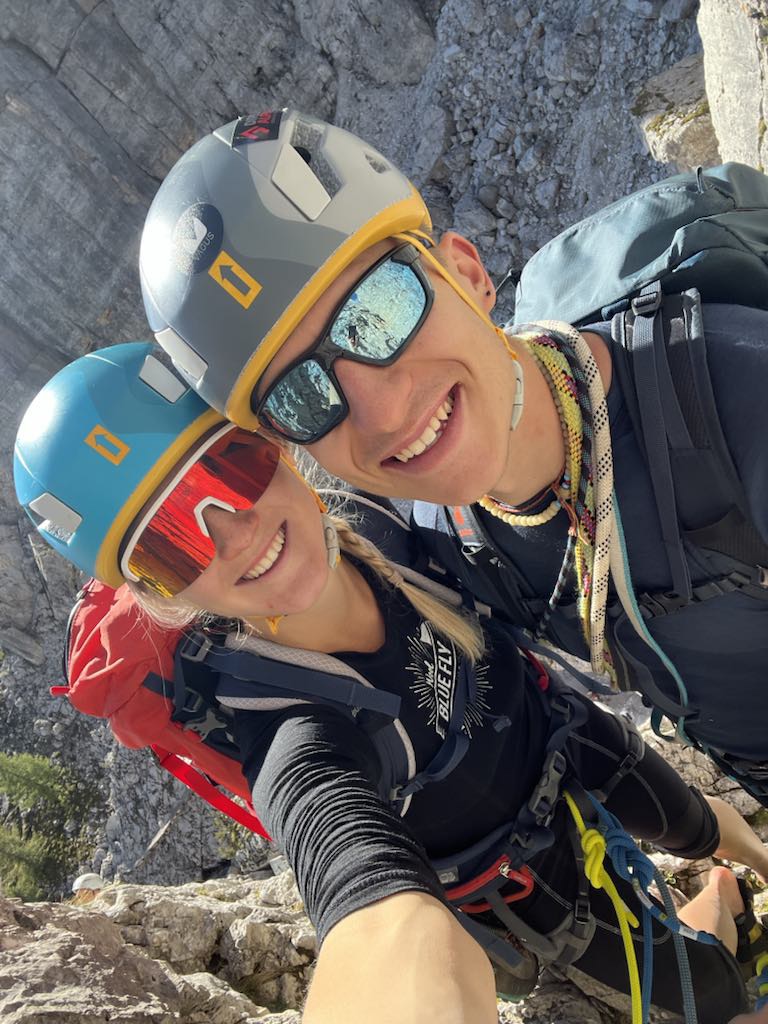
What led you to choose your profession? And why medicine?
Lucie: What led me to choose my profession? I remember a day when I was a child, driving with my mom from Hradec Králové, and the main road was blocked by a traffic accident. It was slowly getting dark, and I watched as the red and blue lights of the emergency vehicles alternated, illuminating the surroundings. When my mom explained what had likely happened, I had a very strange feeling that I still remember today. At that moment, I quietly promised myself that one day I would be able to help people in such situations, and perhaps even arrive at the scene accompanied by those red and blue lights. As I grew up, my ideas about my future career evolved, leading me toward studying physiotherapy, but for several reasons, I ultimately decided on the field of paramedics. Looking back, I am glad I took this path.
Jakub: My original plan was actually the same—I wanted to become a physiotherapist. During my high school years, I attended the Hradiště scout leadership camp every year, where I had the chance to get at least a glimpse, if not a full view, of the work of emergency medical services. At that time, from my position of responsibility, I didn’t fully appreciate this privilege. However, over the next few years, these experiences turned into an interest that eventually outweighed my lifelong fear of needles, the sterile environment of hospitals, and even driving. My decision to pursue my second, now parallel, profession as a mountain rescue paramedic started to take shape during my university studies in Pardubice. With more experienced classmates, I discovered the beauty of climbing and bouldering, dedicated more time to mountain sports (yes, Pardubice is ideal for that), attended a mountain rescue lecture during a ski course, and a year later, I nervously rang the bell at the rescue station in Deštné in the Orlické Mountains with the classic question: "How can I become a member?"
Your stories are inspiring. Looking back, how do you evaluate your paramedic studies in the Czech Republic? Did they prepare you adequately for reality, or were there areas you had to learn in the field?
Both of us only have experience studying at the University of Pardubice, so we can’t compare. However, our studies provided us with the necessary foundations. Naturally, they were more theoretical than practical, but since we both studied this field after graduating from high school, theory was absolutely essential, especially in the first year. Practical experience was to some extent influenced by students' engagement during internships at various departments or emergency medical services.
Of course, there are many things a fresh graduate is not prepared for. How to cope with oneself after a distressing intervention, how to communicate with colleagues and patients in stressful situations, how to handle uncooperative patients. Another unexpected aspect of working in the field is the ever-present need for improvisation in pre-hospital care and often unpredictable intervention conditions.
What situations were the hardest for you at the beginning? Do you remember the moment when you first felt that you were truly part of the integrated rescue system (IZS)?
Jakub: For me personally, but I dare say for both of us, one of the hardest aspects was that after completing the driver's adaptation process, driving an ambulance under the supervision of an experienced paramedic, you suddenly become responsible for the rest of the crew and the patient, trying to transport them safely and as quickly as possible to a medical facility.
Lucie: I found the hardest part to be accepting the responsibility of making decisions about a patient's treatment and further care, decisions that could significantly impact their chances of returning to a quality life.
That makes perfect sense. How do you perceive the cooperation between the different components of the rescue system?
From our own experience, we can say that the cooperation between IZS units in the Czech Republic is at a high level, which usually leads to significantly faster patient transport to the necessary medical facility.
Which interventions are the most physically and mentally demanding for you?
Lucie: The most challenging interventions for me are those involving sick or injured children. Psychologically demanding cases include responding to bereaved individuals coping with the loss of a loved one and life-threatening situations that require quick and precise work.
Jakub: I agree, but to add some lightness, I would also mention physically demanding interventions on the seventh floor of buildings without an elevator, especially when you frequently forget things in the vehicle. Personally, I find repeated calls to patients who abuse emergency services (our system stops counting calls after 50, and unfortunately, we have several "record-holders") particularly frustrating, especially when they are clearly enjoying it.
Is there a moment you are particularly proud of?
Although pride is not generally considered a "good" trait, we all feel it when patients come to visit us after a successful life-saving intervention.
How often do you encounter aggression from patients or their relatives? How do you handle such situations?
We don’t have exact statistics on aggressive patient interventions, but from our experience, most cases involve cooperative patients and their families. When they aren't, well-chosen communication often helps defuse the situation. If aggression does occur, it is usually from patients under the influence of substances or those with psychiatric conditions. What makes these interventions even more challenging for the crew is that they often involve repeat offenders. Fortunately, in collaboration with IZS units, many of these calls are attended with police presence, or we can request them at the scene if needed.
How do you see the future of emergency medical services in the Czech Republic?
What could be changed in this regard?
Many callers to the emergency line 155 have medical issues that could be resolved through a consultation with their general practitioner or by taking over-the-counter medication. This includes common seasonal illnesses such as colds, flu, and stomach viruses, which have been a part of human life for centuries.
Of course, we fully acknowledge that for many patients, these illnesses can worsen chronic conditions, making an in-person visit to the doctor difficult or even life-threatening. However, we also recall numerous cases where we responded to patients who told us upon arrival that they did not have a thermometer, any over-the-counter medicine, or that they felt their life was in danger due to chills accompanying a mild fever.
Since ambulance crews in the field do not have the capability to perform laboratory blood tests, which attending physicians always have access to, this often leads to an overload of hospital emergency departments with such cases. Consequently, this delays the provision of medical care for those who truly need it.
By saying this, we are in no way trying to forbid the public from using emergency medical services. Rather, we are simply urging a return to home treatment for common illnesses and the use of common sense when assessing a patient's condition. A well-stocked home medicine cabinet can be of great help in such situations.
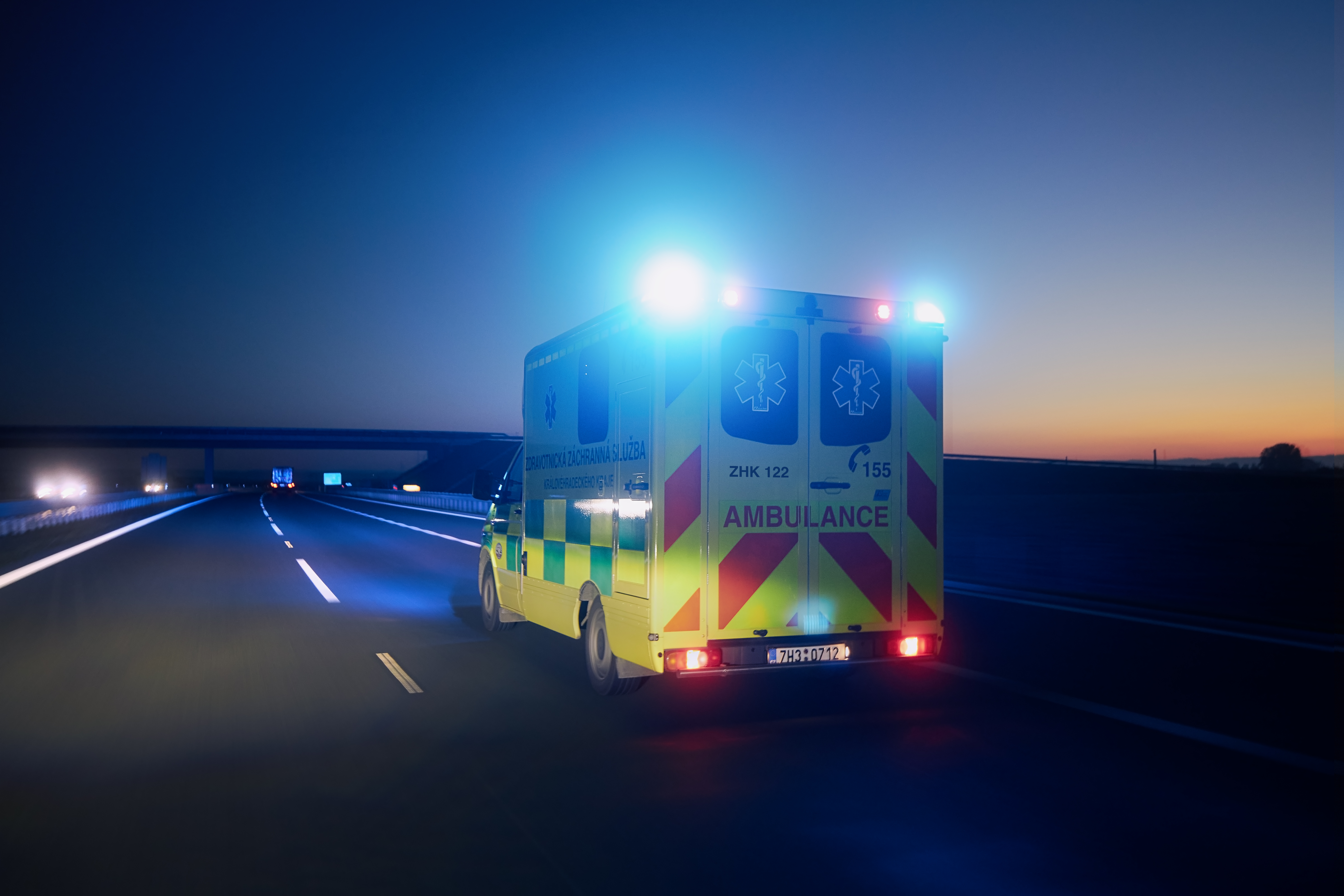
source: the Hradec Králové Region Ambulance Service. (n.d.). Photo gallery. https://www.zzskhk.cz/fotogalerie/
Let's take a look at the mountain rescue service. How does the training and preparation of mountain rescue responders work? What skills are essential?
The training and preparation of future rescuers are managed by the organization itself through a multi-year education cycle. This process begins with expressing interest in future service at a specific mountain rescue station, to which the applicant must have a reasonable commuting distance from their residence. Another factor is the applicant's age at the time of application, which is limited.
This is followed by a multi-year period—two years in my case—during which the applicant becomes familiar with the work of the mountain rescue service, their future colleagues, and the service location. During this period, the applicant must pass annual physical tests: a ski touring circuit in winter and a running circuit in summer within a specified time limit. Besides physical fitness, the applicant also trains in rescue procedures by actively participating in services with future colleagues and attending annual two-day refresher courses, both in summer and winter.
Upon successful completion of the cycle, passing exams, and obtaining approval to attend the basic mountain rescue schools, the applicant becomes a probationary member, the first level of mountain rescue membership. In addition to the recurring obligations mentioned above, the probationary member must complete a one-week summer school and a one-week winter school, both of which conclude—or, in the case of the physical exam, begin—with practical and theoretical exams covering the following topics:
Summer School: Physical fitness, climbing, rescue techniques, medical assistance, understanding the mountain rescue organization, organizing rescue operations, and topographic orientation.
Winter School: Physical fitness, climbing, rescue techniques, medical assistance, meteorology, skiing, avalanche rescue, and professional conduct and communication.
If the probationary member successfully passes the exams at the final, winter school, they are accepted as a volunteer member of the mountain rescue service. They then serve at their designated station on weekends, in their free time, as support for professional staff. Professional members of the rescue service are selected from the pool of volunteer members when additional staff is needed.
All of the above information is available on the official website horskasluzba.cz if you are interested.
Great, thank you for such a detailed description. How do you handle the psychological pressure in extreme situations?
This question is quite personal, so we will each answer it individually, though perhaps similarly.
Jakub: For me, having a fellow responder by my side and following a clearly defined protocol for examination and care helps manage psychological pressure. When dealing with stress, several things help: music, sports, humor, sleep, debriefing with colleagues, and, last but not least, support and understanding from Lucie.
Lucie: One of the most important tools for managing psychological stress for me is debriefing with colleagues immediately after a call or later with Jakub. When no living soul is available, I like to analyze my often unpleasant feelings with my loyal and trustworthy friend chocolate.
Do you encounter problems with the funding of rescue services? What should be the priority in supporting rescuers in the Czech Republic?
As regular members, we don’t have much insight into the funding of rescue services.
We believe the priority should be, and to some extent already is, further education for rescuers through specialized courses. Another equally important aspect is providing support to employees who have responded to very distressing incidents. However, in our organization, this type of support has been at a high level for quite some time.
You both have the same profession. How do you maintain a balance between work and personal life, given that your job is highly demanding and requires intense focus?
Like every coin, our situation has two sides. The bright side is that we understand each other's feelings better, comprehend each other’s needs, and share extraordinary experiences in pre-hospital care that enrich our relationship.
The dark side of our coin, as mentioned in the question, is the demanding nature of 12-hour shifts, which significantly impacts daily routines and habits—especially when both of us are on duty.
While this work schedule might seem toxic for a relationship or marriage, it has helped us recognize the importance of communication, setting boundaries, and establishing rules. Another factor that likely emerged in response to this lifestyle is our mutual effort to spend quality time together, preferably without discussing work-related matters.
That sounds like a solid approach. After a tough shift or rescue operation, how do you “clear your head”?
We both share a love for sports and the mountains, so we usually combine these two passions. Music is our companion even on grocery trips, and we never say no to good food.

What do you think are the most common causes of burnout among rescuers? Can it be prevented?
Jakub: One of the most common causes is the repeated misuse of emergency medical services, which dulls a rescuer’s senses, empathy, and knowledge. Another major factor is routine—mainly due to frequent non-urgent calls—which can lead to disinterest in the job and a lack of motivation to learn.
Lucie: To answer the second question, I believe burnout can be prevented by regularly practicing essential procedures, which rescuers might neglect due to too many routine calls. Interest in the job can also be maintained by keeping up with industry news, attending educational and social events, and, most importantly, filling one’s personal life with activities that help clear the mind and recharge.
Do you have access to regular psychological sessions or debriefings after difficult situations? How is psychological support provided for rescuers in practice, and what impact does it have on your performance?
Our organization has trained employees from within the rescue team who provide interventions upon request—both for patients and their families and for colleagues involved in difficult operations. This internal support is often offered immediately after a call, usually by phone, and can be followed up with in-person sessions.
Additionally, rescuers can seek help from the psychosocial intervention service if they are going through a mentally challenging period or experience. In cases of extraordinary events, a group debriefing is conducted for all involved teams.
Do you have a favorite shared story?
Jakub: We would probably recall our shared night shift on December 24th when we spent almost the entire night chasing an Asian family through the city. Amidst their alcohol-fueled celebrations, a fight broke out between the son-in-law and the mother-in-law. The participants then scattered to different parts of the city, with one of them even engaging in another altercation with a different opponent. The whole case was like a giant puzzle—only during the examination of one of the individuals, with the help of a Czech interpreter, were we given a clue about the possible whereabouts of the other injured person.
After handing over the first patient to the surgical emergency department, we followed the lead we had obtained. Following a brief interlude in the city's night streets, we found the second individual and, accompanied by another interpreter, brought her to the same emergency unit. As fate would have it, the entire family ended up in the same examination area. We soaked in the Christmas atmosphere for a little while longer before setting off in a futile attempt to get some short-lived sleep. Learning from the night's events, I made sure not to end up in a clinch with my own mother-in-law at the festive lunch the next day—thus sparing at least two hospital beds for other patients who lost their battles with either their families or their diets.
What advice would you give to people who want to become paramedics?
We would just like to wish them the best of luck and strong nerves.
A big thank you to Lucie and Jakub for the interview—we wish them strength, courage, and safe interventions!
article was prepared by Andrea


